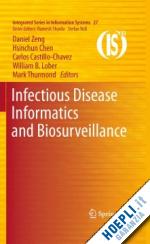Carlos Castillo-Chavez is a Regents Professor, and Joaquin Bustoz Jr. Professor of Mathematical Biology at Arizona State University and the executive director of the Mathematical and Theoretical Biology Institute and Institute for Strengthening the Understanding of Mathematics and Science at the same university. He has won awards by the American Association for the Advancement of Science (AAAS) Mentor Award and Fellow (2007), the Stanislaw M. Ulam Distinguished Scholar by the Center for Nonlinear Studies at Los Alamos National Laboratory (2003), the Society for Advancement of Chicanos and Native Americans in Science (SACNAS) Distinguished Scientist Award (2001), the Presidential Award for Excellence in Science, Mathematics and Engineering Mentoring (1997), and the Presidential Faculty Fellowship Award from the National Science Foundation and the Office of the President of the United States (1992-1997). Dr. Hsinchun Chen is McClelland Professor of Management Information Systems at the University of Arizona and Andersen Consulting Professor of the Year (1999). He received the B.S. degree from the National Chiao-Tung University in Taiwan, the MBA degree from SUNY Buffalo, and the Ph.D. degree in Information Systems from the New York University. He is author/editor of 10 books and more than 130 SCI journal articles covering intelligence analysis, biomedical informatics, data/text/web mining, digital library, knowledge management, and Web computing. His recent books include: Medical Informatics: Knowledge Management and Data Mining in Biomedicine and Intelligence and Security Informatics for International Security: Information Sharing and Data Mining, both published by Springer. Dr. Chen was ranked #8 in publication productivity in Information Systems (CAIS 2005) and #1 in Digital Library research (IP&M 2005) in two recent bibliometric studies. He serves on ten editorial boards including: ACM Transactions on Information Systems, ACM Journal on Educational Resources in Computing, IEEE Transactions on Intelligent Transportation Systems, IEEE Transactions on Systems, Man, and Cybernetics, Journal of the American Society for Information Science and Technology, Decision Support Systems, and International Journal on Digital Library. Dr. Chen is a Scientific Counselor/Advisor of the National Library of Medicine (USA), Academia Sinica (Taiwan), and National Library of China (China), and has served as an advisor for major NSF, DOJ, NLM, and other international research programs in digital library, digital government, medical informatics, and national security research. Dr. Chen is founding director of Artificial Intelligence Lab and Hoffman E-Commerce Lab. The UA Artificial Intelligence Lab, which houses 40+ researchers, has received more than $17M in research funding from NSF, NIH, NLM, DOJ, CIA, and other agencies over the past 15 years. The Hoffman E-Commerce Lab, which has been funded mostly by major IT industry partners, features one of the most advanced e-commerce hardware and software environments in the College of Management. Dr. Chen is conference co-chair of ACM/IEEE Joint Conference on Digital Libraries (JCDL) 2004 and has served as the conference/program co-chair for the past eight International Conferences of Asian Digital Libraries (ICADL), the premiere digital library meeting in Asia that he helped develop. Dr. Chen is also (founding) conference co-chair of the IEEE International Conferences on Intelligence and Security Informatics (ISI) 2003-2006. The ISI conference, which has been sponsored by NSF, CIA, DHS, and NIJ, has become the premiere meeting for international and homeland security IT research. Dr. Chen’s COPLINK system, which has been quoted as a national model for public safety information sharing and analysis, has been adopted in more than 150 law enforcement and intelligence agencies. The COPLINK research had been featured in New York Times, Newsweek, Los Angeles Times, Washington Post, Boston Globe,among others. The COPLINK project was selected as a finalist by the prestigious International Association of Chiefs of Police (IACP)/Motorola 2003 Weaver Seavey Award for Quality in Law Enforcement in 2003. COPLINK research has recently been expanded to border protection (BorderSafe), disease and bioagent surveillance (BioPortal), and terrorism informatics research (Dark Web), funded by NSF, CIA, and DHS. Dr. Chen has also received numerous awards in information technology and knowledge management education and research including: AT&T Foundation Award, SAP Award, the Andersen Consulting Professor of the Year Award, the University of Arizona Technology Innovation Award, and the National Chaio-Tung University Distinguished Alumnus Award. Dr. Chen is an IEEE Fellow. William B. Lober MD MS is an Associate Professor at the University of Washington (UW) in the Schools of Nursing, Medicine, and Public Health & Community Medicine. Dr Lober directs the UW Clinical Informatics Research Group, whi











